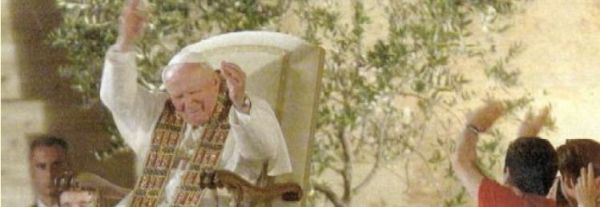2. "Joseph, Son of David, do not fear to take Mary your wife, for that which is conceived in her is of the Holy Spirit; she will bear a son, and you shall call his name Jesus, for he will save his people from their sins" (Mt 1:20-21).
In these words we find the core of biblical truth about St. Joseph; they refer to that moment in his life to which the Fathers of the Church make special reference.
The Evangelist Matthew explains the significance of this moment while also describing how Joseph lived it. However, in order to understand fully both its content and context, it is important to keep in mind the parallel passage in the Gospel of Luke. In Matthew we read: "Now the birth of Jesus Christ took place in this way. When his mother Mary had been betrothed to Joseph, before they came together she was found to be with child of the Holy Spirit" (Mt 1:18). However, the origin of Mary's pregnancy "of the Holy Spirit" is described more fully and explicitly in what Luke tells us about the annunciation of Jesus' birth: "The angel Gabriel was sent from God to a city of Galilee named Nazareth, to a virgin betrothed to a man whose name was Joseph, of the house of David; and the virgin's name was Mary" (Lk 1:26-27). The angel's greeting: "Hail, full of grace, the Lord is with you" (Lk 1:28) created an inner turmoil in Mary and also moved her to reflect. Then the messenger reassured the Virgin and at the same time revealed God's special plan for her: "Do not be afraid, Mary, for you have found favor with God. And behold, you will conceive in your womb and bear a son, and you shall call his name Jesus. He will be great, and will be called the Son of the Most High; and the Lord God will give to him the throne of his father David" (Lk 1:30-32).
A little earlier the Gospel writer had stated that at the moment of the Annunciation, Mary was "betrothed to a man whose name was Joseph, of the house of David." The nature of this "marriage" is explained indirectly when Mary, after hearing what the messenger says about the birth of the child, asks, "How can this be, since I do not know man?" (Lk 1:34) The angel responds: "The Holy Spirit will come upon you, and the power of the Most High will overshadow you; therefore the child to be born will be called holy, the Son of God" (Lk 1:35). Although Mary is already "wedded" to Joseph, she will remain a virgin, because the child conceived in her at the Annunciation was conceived by the power of the Holy Spirit.
At this point Luke's text coincides with Matthew 1:18 and serves to explain what we read there. If, after her marriage to Joseph, Mary is found to be with child of the Holy Spirit," this fact corresponds to all that the Annunciation means, in particular to Mary's final words: "Let it be to me according to your word" (Lk 1:38). In response to what is clearly the plan of God, with the passing of days and weeks Mary's "pregnancy" is visible to the people and to Joseph; she appears before them as one who must give birth and carry within herself the mystery of motherhood.
3. In these circumstances, "her husband Joseph, being a just man and unwilling to put her to shame, resolved to send her away quietly" (Mt 1:19). He did not know how to deal with Mary's "astonishing" motherhood. He certainly sought an answer to this unsettling question, but above all he sought a way out of what was for him a difficult situation. "But as he considered this, behold, an angel of the Lord appeared to him in a dream, saying, 'Joseph, son of David, do not fear to take Mary your wife, for that which is conceived in her is of the Holy Spirit; she will bear a son, and you shall call his name Jesus, for he will save his people from their sins'" (Mt 1:20-21).
There is a strict parallel between the "annunciation" in Matthew's text and the one in Luke. The divine messenger introduces Joseph to the mystery of Mary's motherhood. While remaining a virgin, she who by law is his "spouse" has become a mother through the power of the Holy Spirit. And when the Son in Mary's womb comes into the world, he must receive the name Jesus. This was a name known among the Israelites and sometimes given to their sons. In this case, however, it is the Son who, in accordance with the divine promise, will bring to perfect fulfillment the meaning of the name Jesus-Yehos ua' - which means "God saves."
Joseph is visited by the messenger as "Mary's spouse," as the one who in due time must give this name to the Son to be born of the Virgin of Nazareth who is married to him. It is to Joseph, then, that the messenger turns, entrusting to him the responsibilities of an earthly father with regard to Mary's Son.
"When Joseph woke from sleep, he did as the angel of the Lord commanded him and took Mary as his wife" (cf. Mt 1:24). He took her in all the mystery of her motherhood. He took her together with the Son who had come into the world by the power of the Holy Spirit. In this way he showed a readiness of will like Mary's with regard to what God asked of him through the angel.
[Pope John Paul II, Redemtoris Custos]












